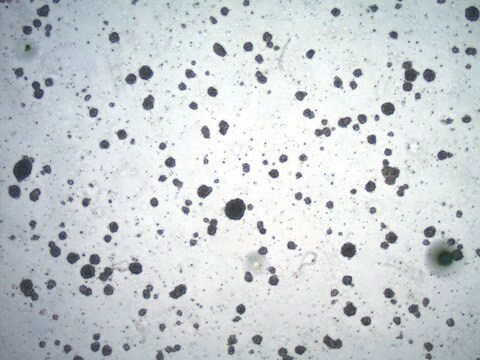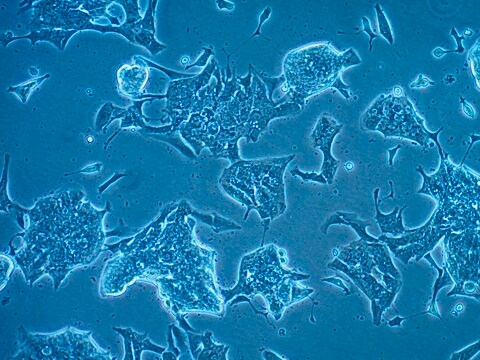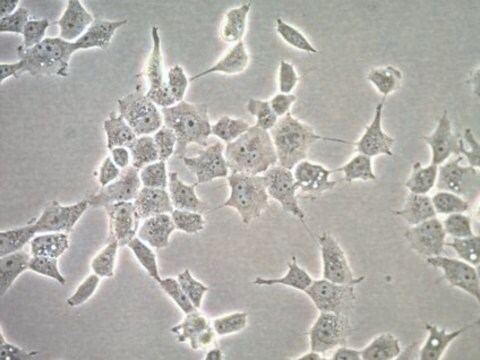SCC431
TB096 Human IDH1-Mutated Astrocytoma Cell Line
Sign Into View Organizational & Contract Pricing
All Photos(3)
About This Item
UNSPSC Code:
12352207
NACRES:
NA.81
Recommended Products
packaging
vial of ≥1X10⁶ cells/vial mg
Quality Level
manufacturer/tradename
Millipore
growth mode
N/A
technique(s)
cell culture | stem cell: suitable
shipped in
liquid nitrogen
storage temp.
−196°C
General description
In glioma cells, a specific point mutation occurs relatively often at the Arg132 location of the IDH1 protein (NADP+-dependent isocitrate dehydrogenase 1) resulting in a gain-of-function mutation that produces D-2-hydroxyglutarate (D-2HG), a prevalent metabolite attributed to carcinogenesis and tumor progression.1 The TB096-2 cell line provides a strong in vitro model to further understand the role of IDH1 mutation in astrocytoma growth mediated by D-2HG conversion. This also provides opportunity to develop therapy solutions which may modulate D-2HG production and help understand the role of wild type IDH1 in conjunction with its mutated allele.
Application
- TB096-2 cells are verified to be of human origin and negative for mouse, rat, Chinese hamster, Golden Syrian hamster, and non-human primate interspecies contamination, as assessed by a Contamination Clear panel by Charles River Animal Diagnostic Services
- Cells tested negative for infectious diseases against a Human Essential CLEAR panel by Charles River Animal Diagnostic Services.
- Cells tested negative for mycoplasma.
Astrocytoma is a nervous system cancer that can be found in the brain or spinal cord. It begins in astrocytes, a type of glial cell which perform a variety of support functions for the nervous tissue such as nutrient transport, maintenance of ionic balance, and repair processes for brain and spinal cord injury. Astrocytoma are quite variable and can cause a solid range of symptoms depending on the location of the tumor. They can also vary in growth, ranging from rather slow-growing tumors to aggressive proliferative tumors. In glioma cells, a specific point mutation occurs relatively often at the Arg132 location of the IDH1 protein (NADP+-dependent isocitrate dehydrogenase 1) resulting in a gain-of-function mutation that produces D-2-hydroxyglutarate (D-2HG), a prevalent metabolite attributed to carcinogenesis and tumor progression.1 The TB096-2 cell line provides a strong in vitro model to further understand the role of IDH1 mutation in astrocytoma growth mediated by D-2HG conversion. This also provides opportunity to develop therapy solutions which may modulate D-2HG production and help understand the role of wild type IDH1 in conjunction with its mutated allele. Source TB096-2 was derived from a 26-year old male anaplastic astrocytoma WHO grade III patient treated at Duke in 2009.1 Tumors were obtained from the Brain Tumor Biorepository at Duke with written informed consent from patients and Institutional Review Board approval and analyzed previously for IDH mutation status.1References1. Cancer Res 2013; 73(2): 496-501.
Features and Benefits
The TB096-2 cell line provides a strong in vitro model to further understand the role of IDH1 mutation in astrocytoma growth mediated by D-2HG conversion. This also provides opportunity to develop therapy solutions which may modulate D-2HG production and help understand the role of wild type IDH1 in conjunction with its mutated allele.
Storage and Stability
TB096-2 human IDH1-mutated astrocytoma cells should be stored in liquid nitrogen until use. The cells can be cultured for at least 10 passages after initial thawing without significantly affecting the cell marker expression and functionality.
Other Notes
This product is intended for sale and sold solely to academic institutions for internal academic research use per the terms of the “Academic Use Agreement” as detailed in the product documentation. For information regarding any other use, please contact licensing@emdmillipore.com.
Disclaimer
RESEARCH USE ONLY. This product is regulated in France when intended to be used for scientific purposes, including for import and export activities (Article L 1211-1 paragraph 2 of the Public Health Code). The purchaser (i.e. enduser) is required to obtain an import authorization from the France Ministry of Research referred in the Article L1245-5-1 II. of Public Health Code. By ordering this product, you are confirming that you have obtained the proper import authorization.
Unless otherwise stated in our catalog or other company documentation accompanying the product(s), our products are intended for research use only and are not to be used for any other purpose, which includes but is not limited to, unauthorized commercial uses, in vitro diagnostic uses, ex vivo or in vivo therapeutic uses or any type of consumption or application to humans or animals.
Storage Class
10 - Combustible liquids
wgk_germany
WGK 2
flash_point_f
Not applicable
flash_point_c
Not applicable
Certificates of Analysis (COA)
Search for Certificates of Analysis (COA) by entering the products Lot/Batch Number. Lot and Batch Numbers can be found on a product’s label following the words ‘Lot’ or ‘Batch’.
Already Own This Product?
Find documentation for the products that you have recently purchased in the Document Library.
Our team of scientists has experience in all areas of research including Life Science, Material Science, Chemical Synthesis, Chromatography, Analytical and many others.
Contact Technical Service





